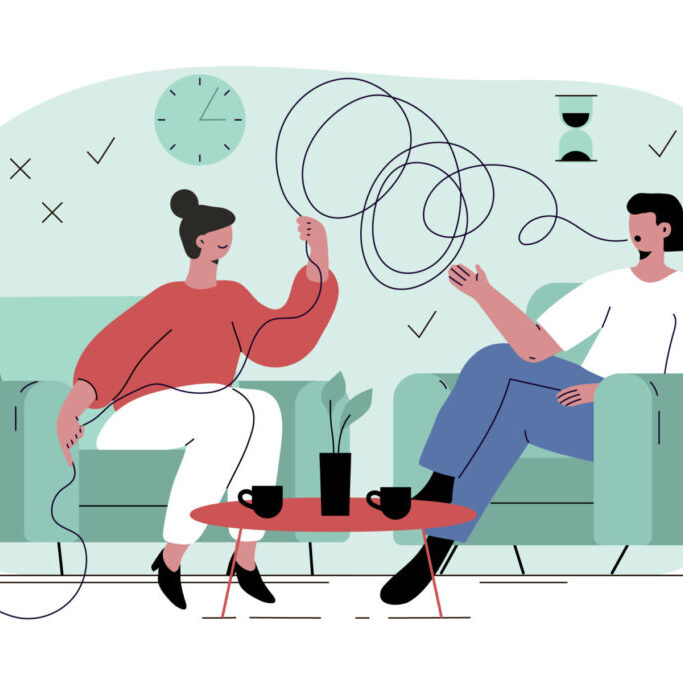Understanding the Psychological Impact of Ghosting

Ghosting has emerged as a peculiar yet increasingly common phenomenon in the digital age, impacting relationships and emotional well-being. Have you ever been on a few dates with someone to have them never respond to communication again? Or built a virtual relationship with the intent to meet in person only to have the person block you or disappear?
The consequences of ghosting can be emotionally devastating.
Unlike the Halloween ghosting tradition (e.g., a playful scenario where individuals ring doorbells, leave behind bags of treats, and vanish before being seen), one person cutting off all communication with another, leaving no explanation, no closure, and certainly no treats can inflict considerable emotional distress, leaving the ghosted party grappling with feelings of rejection and abandonment.
Ghosting is the modern take on the silent treatment, leveraging the passive-aggressive tactic of withholding communication to avoid direct confrontation. This behavior isn’t just a minor social faux pas but a significant one that can undermine the foundations of trust and respect necessary for healthy relationships.
The act of disappearing without a word, especially after a period of meaningful interaction, can trigger deep-seated issues of abandonment and rejection. For the ghoster, it might seem like a quick escape from an uncomfortable situation, but it often exacerbates the very problems they wish to avoid.
Technology – A Catalyst for Ghosting
With the advent of digital technology, connecting with people has never been easier, yet the nuances of human interaction often get lost in translation. Dating apps, while offering the promise of finding a good match through algorithms that consider psychological profiles and interests, also contribute to the impersonal nature of modern dating.
These platforms can, paradoxically, ease social anxiety by providing a buffer through texts and emails before transitioning to more personal interactions like phone calls and face-to-face meetings. Nonetheless, they also create a playground for ghosting by depersonalizing experiences and commodifying romantic connections.
The Psychology Behind Ghosting
Ghosting significantly affects our psychological well-being by undermining the three basic needs identified in the psychological framework by Ryan and Deci (2000): social connection, agency, and competence. This phenomenon is especially prevalent in digital-era relationships. The abrupt cessation of communication without explanation disrupts one’s social bonds and sense of belonging, fostering feelings of isolation and disconnection.
Such experiences are deeply distressing as they not only sever emotional ties but also leave individuals feeling excluded and unloved. Furthermore, ghosting removes any semblance of control from the individual, stripping away their agency. The inability to influence outcomes or obtain closure from unresolved interactions can lead to persistent self-doubt and questions about one’s worth and abilities.
People justify ghosting through various rationalizations. Some believe that ghosting is a deserved consequence for another’s unacceptable behavior, such as rudeness or disrespect. This retribution bias—where we feel compelled to punish bad behavior—is a psychological trigger for ghosting. Others find it easier to ghost because it sidesteps the awkwardness of direct confrontation.
Particularly for individuals who are averse to conflict, ghosting might seem like the easier route, though it often harms their personal growth and the ability to handle future relationships maturely. It is widely viewed as an indicator of poor emotional intelligence and a lack of maturity, empathy, and courage.
Ethically, it raises questions about the minimal effort required in modern communication. A simple message can suffice to end a relationship respectfully, yet many choose to vanish, potentially causing long-term psychological effects on those left without closure.
The Pain of Ghosting According to Cognitive Behavioral Therapy
Understanding why ghosting can be so psychologically painful can be effectively explained through the lens of Cognitive Behavioral Therapy (CBT). It explores how these elements influence each other and can lead to problematic emotional and behavioral reactions.
Cognitive Behavioral Therapy Model of Ghosting
CBT is a widely used psychological treatment that focuses on exploring relationships among a person’s thoughts, feelings, and behaviors. Let’s take a look at the characteristics of ghosting from a cognitive behavioral therapy perspective.
- Activating Event – In the context of ghosting, the activating event is the sudden lack of communication from someone that whom an individual was previously in regular contact. This event is the trigger that sets off a chain of cognitive processes and emotional responses.
For example: Alex and Josh have been seeing each other for a few months. They met through a dating app and things seemed to be going well; they would text daily and meet up several times a week. Suddenly, Josh stops responding to Alex’s texts and calls. Alex sends several messages over the next few days but receives no reply.
- Beliefs and Assumptions – The core of the cognitive behavioral therapy model lies in the beliefs and assumptions that are activated by the event. In the scenario of ghosting, several beliefs may come into play:
- Personalization – Alex may start thinking, “Josh stopped communicating because I did something wrong,” or “There is something unlikable about me.”
- Catastrophizing – Alex might think, “I’ll never find someone who stays,” or “This always happens to me, and it means I’ll end up alone.”
- All-or-Nothing Thinking – Thinking in extremes, such as “Josh clearly hated everything about me,” without recognizing the nuances of human relationships. These automatic thoughts and beliefs are significant because they directly impact Alex’s emotional state. If Alex believes these negative thoughts are undeniably true, they are likely to experience increased feelings of worthlessness, rejection, and anxiety.
- Behaviors – As a result of these beliefs, specific behaviors can follow. In response to ghosting, Alex might:
- Withdraw from social activities – Believing they are always going to be abandoned, Alex might avoid meeting new people or dating again to prevent future pain.
- Obsessive overthinking – Constantly ruminating on what went wrong or what they could have done differently, which can lead to increased stress and anxiety.
- Seeking excessive reassurance – Alex might start reaching out to friends repeatedly to check if they are indeed likable or not, which can strain other relationships.
Mental Health Consequences
The repercussions of ghosting extend to various mental health challenges, including depression and anxiety. The persistent questioning and rumination about what went wrong can deeply affect one’s mental state, leading to depression. Anxiety may also emerge from the stress of managing online personas and the unpredictable nature of digital interactions.
Additionally, the compulsive use of dating apps can mirror other addictive behaviors, as users continuously seek validation or connections, exacerbating feelings of anxiety and inadequacy.
This pattern is often aggravated by the superficial criteria emphasized on these platforms, such as physical appearance, which can lead to significant self-esteem issues and feelings of rejection. To mitigate these effects, it’s crucial for those on the receiving end of ghosting to practice self-care, seek social support, and foster resilience to maintain their self-worth and emotional health.
So, what is Alex (or you) to do after being ghosted?
Coping with Ghosting: CBT Techniques and Interventions
To manage the painful feelings associated with ghosting, CBT techniques would focus on challenging and restructuring the unhelpful beliefs that are causing emotional distress:
- Identify Thoughts – One of the first steps in CBT is to help individuals identify the specific thoughts that arise as a result of being ghosted. These thoughts often involve catastrophic predictions, personalization, and all-or-nothing thinking. Increased attention to one’s thoughts can help to identify thoughts that occur automatically and impact feelings and actions. Mindfulness meditation can increase awareness of thoughts and make this easier.
- Journal – Alex might be encouraged to keep a daily journal of their thoughts and feelings. This can help identify patterns and triggers of negative thinking.
- Challenge Thoughts – Challenging the validity of the negative thoughts and trying to view the situation in a more balanced way, a CBT technique called cognitive restructuring can break the thoughts’ power from impacting emotions. For instance, if Alex believes, “I must have done something wrong,” they might be asked to consider other times when they have successfully maintained relationships or when an ending was not their fault.
- Develop Alternative Explanations – People often jump to conclusions about why they were ghosted, typically assuming it is due to some fault of their own. These conclusions are also “just thoughts.” Because you can think it, doesn’t mean it’s accurate. CBT technique of exploring other explanations that are less personal and self-critical can help you feel better. A CBT therapist might guide Alex to consider various reasons why Josh might have ceased communication that does not reflect on Alex, such as Josh dealing with personal issues or not being ready for a commitment.
- Engage in Perspective-Taking – Encouraging Alex to look at the situation from Josh’s perspective can help reduce the tendency to personalize the ghosting.
- Set Goals – Alex might work on setting goals for re-engaging in social activities or trying new hobbies, which can help rebuild self-confidence and reduce feelings of loneliness.
- Improve Social Skills – This cognitive behavioral therapy goal can be beneficial if Alex feels their social skills are lacking or if they are unsure how to initiate and maintain new relationships. This might include assertiveness training, one of the more common CBT techniques. Assertiveness training would help Alex learn to express his needs and boundaries clearly and can help Alex in future relationships.
- Focus on Self-Care – Practicing self-care is crucial for mental health, especially after experiencing rejection. CBT techniques encourage routines that promote physical and emotional well-being. For example, physical activity has been shown to reduce symptoms of depression and anxiety. Eating a balanced diet can also affect mood positively. And, practices like meditation, yoga, or deep breathing can help manage the anxiety and stress that come from being ghosted.
- Refocus on Resilience – While ghosting can be incredibly difficult, noticing that he is coping can help Alex feel more resilient and prepared for the future.
By applying these CBT techniques interventions, individuals like Alex can not only navigate the immediate emotional distress caused by ghosting but also build stronger, more resilient approaches to interpersonal relationships. This proactive approach helps mitigate negative self-beliefs and promotes a healthier, more optimistic outlook on personal connections.
Final Thoughts
Ghosting can cause significant psychological pain due to the sudden and unexplained loss of contact that leads to spirals of negative thinking and self-doubt. It disrupts social connections, leads to feelings of powerlessness, and impacts self-worth.
For individuals who have experienced ghosting, it’s essential to not take the behavior personally, as it often says more about the ghoster’s shortcomings than their own. Engaging in self-care, expanding social interactions, and practicing resilience can help mitigate emotional pain and help maintain self-esteem.
Building strong relationships online requires clear intentions and mutual effort. Being aware of red flags, investing in honest communication, and maintaining a commitment to meet challenges together is crucial for sustaining relationships, whether they begin online or in person.
By understanding the psychological impacts of ghosting and adopting these proactive strategies, individuals can foster healthier relationships and better navigate the emotional landscapes of modern dating.
If you’ve been ghosted and are struggling, you aren’t alone. Tandem Psychology’s team of experts on relationship issues, queer and LGBT therapy, CBT, and trauma therapy are here to help!
This blog is made for informational and educational purposes only. It is not medical advice. The information in this blog is not intended to (1) replace a one-on-one relationship with a qualified licensed health care provider, (2) create or establish a provider-patient relationship, or (3) create a duty for us to follow up with you.



